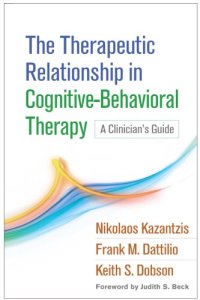
Ebook: The therapeutic relationship in cognitive-behavioral therapy: a clinician's guide
Author: Kazantzis Nikolaos
- Tags: Cognitive Behavioral Therapy, Cognitive therapy, HEALTH & FITNESS--Diseases--General, MEDICAL--Clinical Medicine, MEDICAL--Diseases, MEDICAL--Evidence-Based Medicine, MEDICAL--Internal Medicine, Professional-Patient Relations, Psychotherapeutic Processes, Therapist and patient, Electronic books, HEALTH & FITNESS -- Diseases -- General, MEDICAL -- Clinical Medicine, MEDICAL -- Diseases, MEDICAL -- Evidence-Based Medicine, MEDICAL -- Internal Medicine
- Year: 2017
- Publisher: The Guilford Press
- City: New York;NY
- Language: English
- pdf
From leading cognitive-behavioral therapy (CBT) experts, this book describes ways to tailor empirically supported relationship factors that can strengthen collaboration, empiricism, and Socratic dialogue and improve outcomes. In an accessible style, it provides practical clinical recommendations accompanied by rich case examples and self-reflection exercises. The book shows how to use a strong case conceptualization to decide when to target relationship issues, what specific strategies to use (for example, expressing empathy or requesting client feedback), and how to navigate the therapist's own emotional responses in session. Special topics include enhancing the therapeutic relationship with couples, families, groups, and children and adolescents. Reproducible worksheets can be downloaded and printed in a convenient 8 1/2" x 11" size.;Foreword / Judith S. Beck -- Introduction -- Defining the therapeutic relationship in CBT -- Part I. Generic and CBT-specific relationship elements. Tailoring empirically supported relationship elements with cognitive case conceptualization ; Collaboration and empiricism ; Socratic dialogue and guided discovery -- Part II. Application of the guidance in therapy. Setting agendas and establishing pace and session goals ; Behaviorally focused interventions ; Cognitively focused interventions ; Cognitive and behavioral experiments ; Between-session (homework) interventions ; Concluding relationships and relapse prevention -- Part III. Therapist reactions and therapy contexts ; Ethics and safeguards to the therapeutic relationship ; Identifying and managing therapist reactions ; Working with couples, families, and groups ; Working with children and adolescents / Mark J. Knepley, Hannah Frank, and Philip C. Kendall.
Download the book The therapeutic relationship in cognitive-behavioral therapy: a clinician's guide for free or read online
Continue reading on any device:

Last viewed books
Related books
{related-news}
Comments (0)